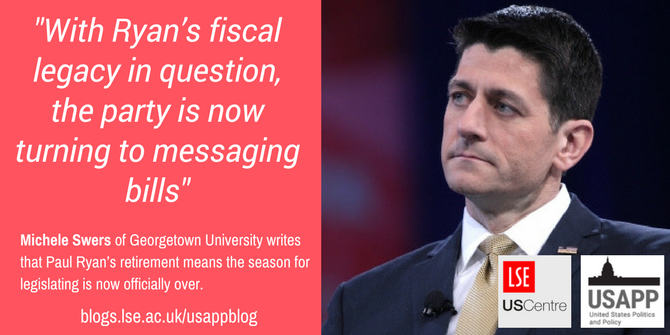 This week, the Speaker of the House, Paul Ryan (R-WI), announced that he would be handing in his gavel at year’s end and would not run for reelection. Michele L. Swers writes that before becoming Speaker, Ryan was a well-respected conservative in pursuit of budgetary reform. In a job that he only took reluctantly, his ability to legislate effectively as Speaker has been stymied not only by divisions within Congressional Republicans, but by a President whose agenda has departed greatly from Ryan’s own vision of conservative leadership.
This week, the Speaker of the House, Paul Ryan (R-WI), announced that he would be handing in his gavel at year’s end and would not run for reelection. Michele L. Swers writes that before becoming Speaker, Ryan was a well-respected conservative in pursuit of budgetary reform. In a job that he only took reluctantly, his ability to legislate effectively as Speaker has been stymied not only by divisions within Congressional Republicans, but by a President whose agenda has departed greatly from Ryan’s own vision of conservative leadership.
Paul Ryan’s departure from Congress after the 2018 elections was widely anticipated. However, his decision to announce his retirement 7 months before the elections has sent shock waves across the capital. Republicans are already reeling from a steady flow of members heading for the exits. The loss of the Speaker could further demoralize activists and donors by sending a signal that Ryan does not believe that Republicans will retain the majority. Compounding the party’s problems, Republican donors might not be as eager to open their wallets to a lame duck Speaker. While political considerations would dictate against a retirement announcement, Ryan is at heart a policy wonk and he clearly does not see a path for significant legislative accomplishments before the midterms.
Throughout his congressional career, Ryan’s main focus has been promoting fiscal conservatism by spurring economic growth through tax cuts and reining in federal spending. In the lead up to the Tea Party fueled 2010 Republican wave, he sold this vision for conservative leadership with future party leaders, Eric Cantor and Kevin McCarthy, in a book entitled Young Guns: A New Generation of Conservative Leaders.
After the 2010 election, Ryan rose to chair the House Budget Committee. From that post he crafted detailed budgets that were hailed for their boldness by conservatives because they embraced entitlement reform. Medicare, Medicaid, and Social Security are among the largest drivers of government spending but they are also very popular with the American public. Ryan proposed to block grant Medicaid and turn more responsibility over to the states. He would limit Medicare spending by offering premium support rather than fixed payment for services. Ryan’s budgets and conservative credentials led Mitt Romney to make him his 2012 vice-presidential nominee as he sought to shore up conservative support.
Yet, Ryan’s fiscal plans fell victim to institutional dynamics that require both parties to come to the table to overcome procedural hurdles. These obstacles are exacerbated in periods of divided government and extreme partisan polarization. With a Democratic President Obama and Democrats controlling the Senate, a body that generally requires a 60 vote supermajority to move consequential legislation, Ryan’s ambitious reforms were stymied. These institutional barriers enraged the newly elected Tea Party Republicans who preferred confrontation to compromise and were willing to use government shutdowns and potential default on the national debt to advance their goals of Obamacare repeal, cutting domestic spending, and defunding Planned Parenthood. Lacking Republican votes, Speaker John Boehner (R-OH) increasingly turned to Democrats to cut deals to advance government funding bills. Frustrated by Boehner’s disregard for conservative priorities, Mark Meadows (R-NC) a member of a group of fiercely conservative legislators known as the Freedom Caucus, filed a motion to vacate the chair that ultimately toppled the Speaker.
In the chaos that followed, Ryan emerged as the only member that could bridge the divide between the establishment and the more confrontational members of the Freedom Caucus. Ryan reluctantly left his dream job as House Ways and Means committee chair, where he planned to develop tax reform, to take on the more politically divisive role of House Speaker. While Ryan’s relationship with the Freedom Caucus remained tense, his willingness to consult with and listen to their concerns garnered more goodwill than Boehner had been able to achieve.

“Paul Ryan” by Gage Skidmore is licensed under CC BY SA 2.0
Ryan’s greatest challenge came in 2017 as Republicans moved from an opposition party to a governing party. In the opposition, Republicans could focus on messaging and advertising their principles to the electorate to signal what they would do if they were in charge. A prime example of this dynamic is the more than 50 votes held to repeal or scale back Obamacare by 2014. However, governing requires compromise and managing the details of policy. Ryan found Republicans were divided when they tried to replace Obamacare and many were reluctant to eliminate the expanded Medicaid benefits that provided insurance to many of their constituents. After an initial defeat and an ugly period of angry town halls protesting Republican plans, Ryan did push a bill through the House but he failed to forge agreement with the Senate.
In addition to managing his increasingly fractious caucus, Ryan had to navigate a relationship with a president who won by denigrating Washington establishment Republicans to forge a hostile takeover of the Republican Party. It is common for the leadership of the president’s party to promote his agenda and protect him from opposition party attacks and calls for investigations. Yet President Trump’s agenda does not align with Paul Ryan’s vision of conservative leadership. President Trump promised not to touch entitlements like Medicaid and Medicare. While Ryan and other conservatives are free traders, President Trump promotes a populist America first vision that wants to protect American industries by imposing tariffs, rejecting past trade deals, and restricting immigration.
To date, Ryan and congressional Republicans have cooperated on areas of agreement. They started by employing the Congressional Review Act to roll back burdensome regulations drafted in the waning months of the Obama administration. After Obamacare repeal failed, they pivoted to a major tax reform that is the centerpiece of Republicans’ midterm election pitch. Indeed, after the bill passed Tom Cole (R-OK) opined that “God made Republicans to cut taxes.”
Perhaps the greatest challenge for Ryan has been the imperative of the Speaker to defend his president from Democratic attacks. To maintain a relationship with the president, Ryan has turned a blind eye to Trump’s vitriolic and sometimes racially charged tweets and backed Intelligence Committee Chair Devin Nunes’s efforts to impede the Russia investigation. These actions have diminished his standing as a positive, idealistic conservative.
Now that Republicans have passed an omnibus budget bill to fund the government through the midterms there are no other must pass bills that can serve as vehicles for conservative priorities. Moreover, conservatives and President Trump are now denouncing the bill for its $1.3 trillion-dollar price tag and its wasteful domestic spending. With Ryan’s fiscal legacy in question, the party is now turning to messaging bills. The day after Ryan announced his retirement, the House took up a balanced budget amendment. Meanwhile, the Senate will spend most of its time confirming executive branch and judicial nominees including replacements for the CIA director and the Secretaries of State and the Veterans Administration that President Trump has fired. The life-time judicial appointments can secure a conservative legacy on the courts beyond the Trump presidency. With grand policy proposals like entitlement reform off the table and a constant stream of controversy emanating from the White House, it is a good time for Ryan to declare his retirement and look for new ways to promote his vision of conservative politics.
Please read our comments policy before commenting.
Note: This article gives the views of the authors, and not the position of USApp– American Politics and Policy, nor of the London School of Economics.
Shortened URL for this post: http://bit.ly/2vduNSM
About the author
 Michele Swers – Georgetown University
Michele Swers – Georgetown University
Michele Swers is a Professor of American Government in the Department of Government at Georgetown University. Her research interests encompass Congress, Congressional elections, and Women and Politics. Her most recent book, Women in the Club: Gender and Policy Making in the Senate (University of Chicago Press 2013) examines the impact of gender on senators’ policy activities in the areas of women’s issues, national security, and judicial nominations.






